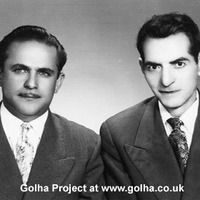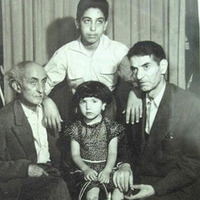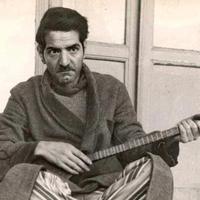Shahriyar
Shahriyar Tabrizi, Sayyid Muhammad Husayn Bihjat (1906-1988), son of Hajj Miraqa Khushknabi. A poet with nom de plume Shahriyar. Born in Tabriz, he spent his childhood in his mother’s village, Qish Qurshaq, and his father’s, Khushknab, in the district of Qarachaman, Azerbaijan, Iran. Owing to the emergence of the Constitutional Revolution in Tabriz, he led a rural life in his childhood. His father, Hajj Miraqa Khushknabi was a lawyer practicing in Tabriz. Having completed his junior high school in Tabriz, he went to Tehran to further his studies in 1921. He studied at Dar al-Funun until 1924, but thereafter studied medicine at the University of Tehran. He left the medical school six months before his graduation and had to work at the Statistics Department in Mashhad and Nayshabur, Khurasan, for four years. Then, he returned to Tehran. His father died in 1934 during Shahriyar’s stay in Khurasan. His mother died in June 1952. He fell in love with a girl in his last year at the medical school, but was unsuccessful in asking for her hand in marriage, since she found another suitor attached to the court and considering the poor lover’s financial status, her family consented to the marry their daughter to the affluent suitor. After this heavy blow, he left his studies in his last year and turned toward poetry. His defeat even led to his fallin ill and beinh hospitalized. Having heard of the story, the beloved, accompanied by her husband, visited Shahriyar in the hospital, following which the latter composed a poem in his sick bed, which was later sung by Ghulam Husayn Banan. Having found employment at the Agricultural Bank (Bank-i Kishavarzi) in 1936, he was transferred to Tabriz. He married a relative, ‘Azizih ‘Amid Khaliqi, in 1953 by whom he had two daughters, Shahrzad and Maryam, and a son, Hadi. After his return to his hometown, he lived there till his last days, teaching for a while at the Faculty of Letters, University of Tabriz.
Shahriyar published his first collection of poetry in 1929 to which introductions were written by Malik al-Shu’ara’ Bahar, Sa’id Nafisi, and Pazhman Bakhtiyari. The date of his death is named as the ‘Day of Persian Poetry and Belles-Lettres’. In his Heydar Babaya Salam, composed in 1950-1951, one of his most popular poems and one of the most significant Azerbaijani Turkish literary masterpieces, he enumerates the originality and beauty of the country. He had mastered the different Persian poetical forms, e.g. qasida, mathnawi, ghazal, qit’a, quatrain, and nima’i. His popular ghazals include ‘‘Ali Ey Huma-yi Rahmat’ and ‘Amadi Janam bih Qurbanat’. He was particularly devoted to Imam ‘Ali and was deeply attached to Hafiz. He has been declared as one of the guardians of the poetry and belles-lettres of the homeland by the University of Tabriz, having awarded him an honorary doctorate by the Faculty of Letters. He was hospitalized at the Mehr Hospital in his last days owing to his ailing health and he died on 17 September 1988. As he willed, he was buried in the Maqbarat al-Shuhada’ [Cemetery], Tabriz.
He used Bahjat as his pen name in his early poetical career, but he later changed it to Shahriyar. His defeat in love in his youth is regarded as a divine grace, since it set his passionate vigor ablaze and led his inwardly intuitive growth to its spiritual zenith such that he obtained deliverance from mundane attachments, made him a man of heart, and changed the tone of his compositions. Thus, he successfully passed the trials of sorrow and agony and attained to spiritual perfection in the art of poetry. Shahriyar had a delicate temperament, sensitive heart, and passionate and restless spirit. He was acquainted with music and played the sitar. His biographical account and memoires are well reflected in his poetry. His mystical love reverberates in some of his ghazals, e.g. Intizar; Jam’ u Tafriq; Wahshi-Shikar; Yusuf-i Gumgashtih; Musafir-i Hamadan; Haraj-i Ishq; Saz-i Saba; Na-yi Shaban; Ashk-i Maryam; Du Murgh-i Bihishti. His disapointments and failures are reflected in some ghazals, e.g. Gawhar-furush; Nakami-ha; Jaras-i Karavan; Nalih-yi Ruh; Masnawi-yi Shi’r; Hikmat; Zafaf-i Sha’ir; Sarnivisht-i Shi’ir. Many of his pleasant and unpleasant memories have found expression in Hazyan-i Dil; Heydarbaba; Afsanih-yi Shab. His poetical composition ‘Heydar baba-yi Salam’, his immortal work and the earliest of his poetical compositions in his mother tongue, has been disseminated far and wide not only in the remotest villages in Azerbaijan, but also in Turkey and Caucasus. Inspired by Azeri folklore, it has been published several times in Turkey and the Republic of Azerbaijan. It is one of the best Azeri Turkish literary compositions which has been the subject of discussions in many a university in the world, e.g. Columbia University. Some musicians, e.g. Hazhdak, the famous Armenian composer, have set it to music. His poetry is a reflection of human agony. He also excels other poets in expressing love in the purest form. Besides his poems dedicated to his homeland and its customs, he also wrote exquisitely elegant poetry in Turkish and Persian on the exalted ranks of parents. His love for his homeland is elegantly reflected in his ghazal ‘‘Iyd-i Khun’; his qasida ‘Mihman-i Shahriwar’; ‘Azarbayjan’; ‘Shiwan’; and his mathnawi ‘Takht-i Jamshid’. He composed poetry in Azeri Turkish, Persian, and Arabic. His sensitive heart and poetical verve is imbued in his poetry which soars on the wings of his dynamic and creative imagination. His poetry, in any form and theme, reflects such features and clearly turns towards innovativeness and reform. The poems composed for and in the memoriam of Nima, the changes made in some of his poems in terms of form and poetical diction, the difference between imagery and appreciation in the traditional form, and many of reflections of his poetry bear witness to his experiments in this respect and his numerous other experiments. His Divan mainly comprises his ghazals. Simplicity and popularity of diction and expression include the factors lying behind his popularity. He expressed his emotions, imaginations, and ideas with his sensitive spirit and rich poetical talent in the language used by people, hence the popular appreciation of his poetry. He composed poems in different forms on different themes, ranging from patriotic, social, historical, and religious. Some of his poems reflect the events of his time. Novelty of theme, imagination, interpretation, and even form distinguishes his poetry from that of his contemporaries. The majority of his compositions reflect occasions and states of mind; as a consequence of which he makes use of everyday words and expressions. It is simply his depictions of his times that differentiates his poetry from that of his predecessors.
Az Bahar ta Shahriyar (653-679); Chaharsad Sha’ir-i Barguzida-yi Parsiguy (510-520); Sukhanvaran-i Nami-yi Mu’asir-i Iran (3, 2107-2115).



 In association with The Iran Heritage Foundation © All rights reserved 2024. Jane Lewisohn | Website by
In association with The Iran Heritage Foundation © All rights reserved 2024. Jane Lewisohn | Website by